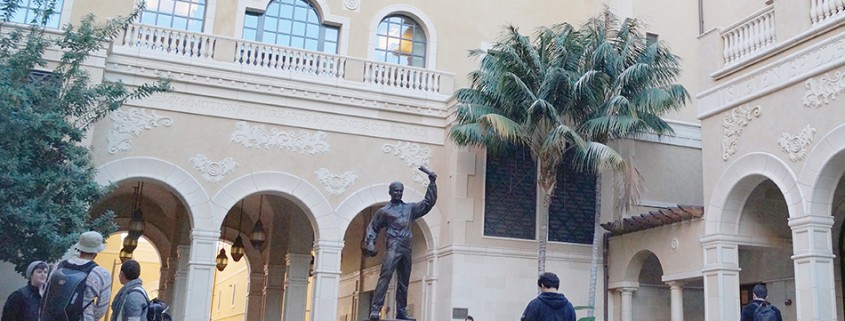Cinema school explores virtual reality technology
The School for Cinematic Arts has created a partnership with the software company Jaunt VR, which provides virtual reality cameras for immersive cinematic experiences, to create the Jaunt Virtual Reality Incubator, which will be finalized this week. Students involved in the lab will develop virtual reality content and explore new storytelling techniques.
The virtual reality lab will be led by Professor Candace Reckinger, who specializes in hybrid media and got her start in animation for music videos, and will be housed on the third floor of the Interactive Media Building building in the SCA. Faculty members Eric Hanson, a VR professional who works for Jaunt, Mike Patterson, a visual music director and animator, and Alex McDowell, a production designer, will join Reckinger. In Reckinger’s lab, students will be able to collaborate with the Jaunt team to create their own virtual reality content.
As part of this collaboration, the faculty at SCA will be able to use Jaunt’s resources to provide internships to their students and participate in ongoing virtual reality research and development.
“We’re going to do focused research on what’s the new language for storytelling in VR,” Reckinger said.
So far, the lab has been funded for three years. Jaunt will loan the SCA two Jaunt One virtual reality cameras and playback technology during that time period. The first year will be an experiential learning phase, and the lab will offer seminars to get students acclimated to virtual reality technology. By the second and third year of the partnership, the film school hopes that classes will emerge.
Once the space has been partitioned in the SCI building, USC will hire full-time employees to staff the lab and offer technical assistance to students. The lab will be modeled off of Jaunt’s own lab in Santa Monica.
Jaunt has approached the film school with the hopes that they could use the Virtual Reality Incubator to help advance their experimental department.
“They are involved in narrative projects, experiential projects and experimental projects,” Reckinger said. “Jaunt looks at us as being the experimental arm.”
To find out how their cameras could be used for cinematic experiences, Jaunt looked to SCA. In January, Scott Fisher, the associate dean of research at SCA and Michael Fink, the Kortschak Family Endowed Division Chair in film and television production, began talking to Jaunt about the partnership.
“Jaunt was really eager to get a relationship going with the Cinema School,” Reckinger said.
The Jaunt Cinematic Virtual Reality Lab will add to existing research labs in the Cinematic Arts school, including Change Making Media, Experimental Audio Design and Transient Media. Jaunt will be the first lab to deal specifically with virtual reality. Furthermore, students will be able to use hardware that will not be available to the general public to determine how to use virtual reality to tell stories.
“Storytelling is the real challenge, and that’s the one everybody wants to do,” Reckinger said. “D.W. Griffith was the film director who basically started to figure out the language of the feature film, and we’re at a similar moment now.”
SCA students will be able to network and learn from executives in the technology sector. Jaunt VR brings in industry professionals with experience in prominent technology companies such as Apple, Intel and Lucasfilm.
Jaunt’s partnership with SCA comes as part of a push to prepare students for the changing media industry, in which virtual reality has become a reality.
“USC is really in a process of growth, and the VR lab is a big part of how they are moving into new media,” Reckinger said.

